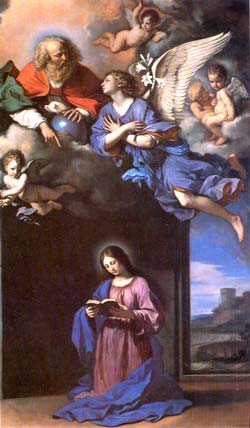 In the second mystery we contemplate the triumph of the Father at the moment of the “Fiat” of Mary during the Annunciation.
In the second mystery we contemplate the triumph of the Father at the moment of the “Fiat” of Mary during the Annunciation.
“The Angel said to Mary: “Do not fear Mary. You have found favour with God. You shall conceive and bear a son and give Him the name of Jesus. Great will be His dignity and He will be called the Son of the Most High; the Lord God will give Him the throne of David His Father. He will rule over the house of Jacob forever and His reign will be without end”. Then Mary said: “Behold, I am the handmaid of the Lord, let what you have said be done to me” (Lk 1:30 and following).
The triumph of the Father consists therefore in coming back to take possession of His creatures. This must make us reflect on the importance of our will: if we say “no” to God, we do not allow Him to come and we remain alone with ourselves. There is darkness, desperation, death.
If we say “yes” to Him and allow Him to come, the Light shines in the darkness of our spirit and we become “the living glory of God”. Like Jesus, like Mary.
Mary, with her “yes” cancels Eve’s “no” and receives God who – with an act of humility and infinite Love – becomes the Son of man and once again takes up His dwelling in His paradise.
Jesus, the new Adam, by saying “I come to do your will, O God” (Heb. 10:9), allows the Father to accomplish the new creation. Jesus and Mary are the prototypes of the new humanity from which we were reborn. If, like them, we also open ourselves completely to God and allow Him to make His dwelling place in us, He will be able to spread His Kingdom of Light by means of us as well.
Let us learn to live this infinite reality. Let us learn to be, like Jesus and Mary, the triumph of the Love of the Father in an eternal “yes”.
Saying “yes” to the Will of the Father is difficult, because sooner or later His Will will clash with ours; we will find ourselves in unpleasant situations: it is the chalice we must drink, but we will not like it. It will be Getsemani, the hour of our death and our resurrection.










